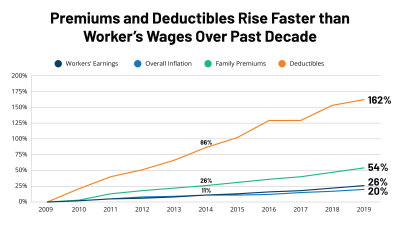 Benchmark Employer Survey Finds Average Family Premiums Now Top $20,000
News Release
Benchmark Employer Survey Finds Average Family Premiums Now Top $20,000
News Release
Annual family premiums for employer-sponsored health insurance rose 5% to average $20,576 this year, according to the 2019 benchmark KFF Employer Health Benefits Survey released today. Workers’ wages rose 3.4% and inflation rose 2% over the same period. On average, workers this year are contributing $6,015 toward the cost of family coverage, with employers paying the rest.